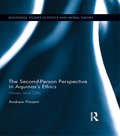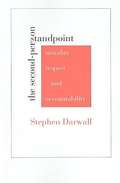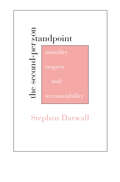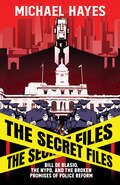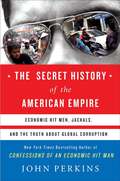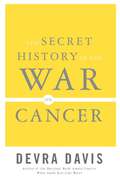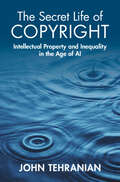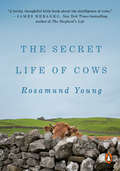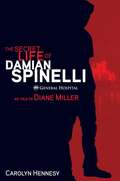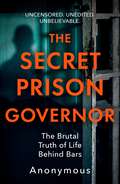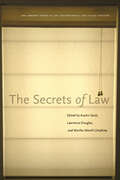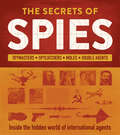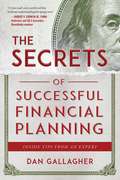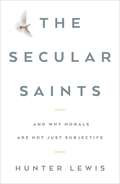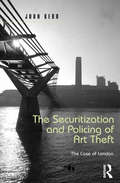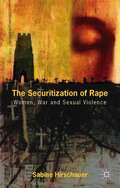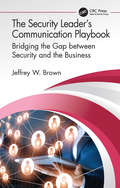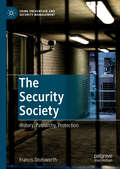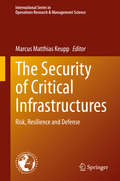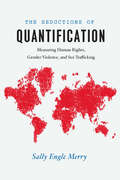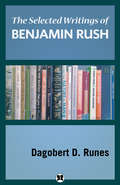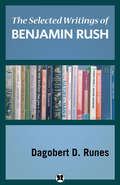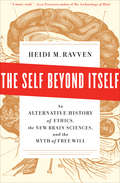- Table View
- List View
The Second-Person Perspective in Aquinas’s Ethics: Virtues and Gifts (Routledge Studies in Ethics and Moral Theory #17)
by Andrew PinsentThomas Aquinas devoted a substantial proportion of his greatest works to the virtues. Yet, despite the availability of these texts (and centuries of commentary), Aquinas’s virtue ethics remains mysterious, leaving readers with many unanswered questions. In this book, Pinsent argues that the key to understanding Aquinas’s approach is to be found in an association between: a) attributes he appends to the virtues, and b) interpersonal capacities investigated by the science of social cognition, especially in the context of autistic spectrum disorder. The book uses this research to argue that Aquinas’s approach to the virtues is radically non-Aristotelian and founded on the concept of second-person relatedness.To demonstrate the explanatory power of this principle, Pinsent shows how the second-person perspective gives interpretation to Aquinas’s descriptions of the virtues and offers a key to long-standing problems, such as the reconciliation of magnanimity and humility. The principle of second-person relatedness also interprets acts that Aquinas describes as the fruition of the virtues. Pinsent concludes by considering how this approach may shape future developments in virtue ethics.
The Second-Person Standpoint: Morality, Respect, and Accountability
by Stephen DarwallStephen Darwall argues, from our failure to appreciate the essentially interpersonal character of moral obligation. After showing how attempts to vindicate morality have tended to change the subject's falling back on non moral values or practical, first-person considerations, Darwall elaborates the interpersonal nature of moral obligations: their inherent link to our responsibilities to one another as members of the moral community. As Darwall defines it, the concept of moral obligation has an irreducibly second-person aspect; it presupposes our authority to make claims and demands on one another. And so too do many other central notions, including those of rights, the dignity of and respect for persons, and the very concept of person itself. The result is nothing less than a fundamental reorientation of moral theory that enables it at last to account for morality's supreme authority, an account that Darwall carries from the realm of theory to the practical world of second-person attitudes, emotions, and actions.
The Second-Person Standpoint: Morality, Respect, and Accountability
by Stephen DarwallWhy should we avoid doing moral wrong? The inability of philosophy to answer this question in a compelling manner—along with the moral skepticism and ethical confusion that ensue—result, Stephen Darwall argues, from our failure to appreciate the essentially interpersonal character of moral obligation. After showing how attempts to vindicate morality have tended to change the subject—falling back on non-moral values or practical, first-person considerations—Darwall elaborates the interpersonal nature of moral obligations: their inherent link to our responsibilities to one another as members of the moral community. As Darwall defines it, the concept of moral obligation has an irreducibly second-person aspect; it presupposes our authority to make claims and demands on one another. And so too do many other central notions, including those of rights, the dignity of and respect for persons, and the very concept of person itself. The result is nothing less than a fundamental reorientation of moral theory that enables it at last to account for morality’s supreme authority—an account that Darwall carries from the realm of theory to the practical world of second-person attitudes, emotions, and actions.
The Secret Files: Bill De Blasio, The NYPD, and The Broken Promises of Police Reform
by Michael HayesAn unprecedented breakdown of the NYPD&’s powerful network of police unions, pro-police lawyers, and top brass who work relentlessly to shield police officers from any real accountabilityFor readers of long-form, hard-hitting journalistic exposés like We Own This City, a compelling look at how we do—and don't—hold police responsible in America, by an award-winning progressive reporter covering the NYPD police beatIn 2018, reporter Michael Hayes uncovered a major story about how the NYPD was not only turning a blind eye to police misconduct, but also allowing hundreds of officers with severe misconduct charges to remain on the force. In the aftermath of that story, then-Mayor Bill de Blasio attempted to reform the department only to abandon his plans.While de Blasio may have suffered a political setback, it&’s New Yorkers who are the true victims of this failure to deliver accountability and transparency. The state has a law that specifically prevents the public from learning about concealed police records. New Yorkers are increasingly distrustful of the police after witnessing their loved ones being targeted, brutalized, and murdered with near impunity.Hayes takes readers inside decades of police corruption and controversial laws, chronicling the stories of the families and activists who have had enough. He makes a compelling case for the limits of reform in the aftermath of the major Black Lives Matter rallies following the murder of George Floyd and growing calls to defund the police.
The Secret History Of The American Empire: Economic Hit Men, Jackals, And The Truth About Global Corruption
by John PerkinsFrom the book jacket... In his stunning memoir, Confessions of an Economic Hit Man, which spent more than a year on the New York Times bestseller list, John Perkins detailed his role in the 1970s and '80s in the international corporate intrigues that created a de facto American Empire. This riveting, behind-the-scenes exposé unfolded like a cinematic blockbuster told through the eyes of a man who once helped shape that empire. Now, in The Secret History of the American Empire, Perkins zeroes in on hot spots around the world today and, drawing on interviews with other hit men, jackals, CIA operatives, reporters, and activists, examines the current geopolitical crisis. Instability is the norm: It's clear that the world we've created is dangerous and no longer sustainable. How did we get here? Who's responsible? What good have we done? And at what cost? And what can we do to change things for the next generations? Addressing these questions and more, Perkins reveals the secret history behind the events that have defined our world, including: * The current Latin-American revolution and its lessons for democracy * How the "defeats" in Vietnam and Iraq benefited big business * The role oflsrael as "Fortress America" in the Middle East * Tragic repercussions of the IMF's "Asian Economic Collapse" and Clinton's "African Renaissance" * U.S. blunders in Tibet, Congo, Lebanon, and Venezuela * Jackal forays to assassinate democratic presidents From the U.S. military in Iraq to infrastructure development in Indonesia, from Peace Corps volunteers in Africa to jackals in Venezuela, Perkins exposes a web of corruption and corporate skullduggery. Alarming yet hopeful. The Secret History of the American Empire concludes with a clear-eyed look toward the future and a compassionate plan to reimagine the world.
The Secret History of the War on Cancer
by Devra DavisThe War on Cancer set out to find, treat, and cure a disease. Left untouched were many of the things known to cause cancer, including tobacco, the workplace, radiation, or the global environment. Proof of how the world in which we live and work affects whether we get cancer was either overlooked or suppressed. This has been no accident. The War on Cancer was run by leaders of industries that made cancer-causing products, and sometimes also profited from drugs and technologies for finding and treating the disease. Filled with compelling personalities and never-before-revealed information, The Secret History of the War on Cancer shows how we began fighting the wrong war, with the wrong weapons, against the wrong enemies-a legacy that persists to this day. This is the gripping story of a major public health effort diverted and distorted for private gain. A portion of the profits from this book will go to support research on cancer prevention.
The Secret Life of Copyright: Intellectual Property and Inequality in the Age of AI
by John TehranianIn The Secret Life of Copyright, copyright law meets Black Lives Matter and #MeToo as the book examines how copyright law unexpectedly perpetuates inequalities along racial, gender, and socioeconomic lines while undermining progress in the arts. Drawing on numerous case studies, the book argues that, despite their purported neutrality, key doctrines governing copyrights-such as authorship, derivative rights, fair use, and immunity from First Amendment scrutiny-systematically disadvantage individuals from traditionally marginalized communities. The work advocates for a more robust copyright system that better addresses egalitarian concerns and serves the interests of creativity. Given that laws regulating the use of creative content increasingly mediate participation and privilege in the digital world, The Secret Life of Copyright provides a template for a more just and equitable copyright system.
The Secret Life of Cows
by Rosamund Young"Within a day of receiving this book, I had consumed it... Absorbing, moving, and compulsively readable."—Lydia DavisIn this affectionate, heart-warming chronicle, Rosamund Young distills a lifetime of organic farming wisdom, describing the surprising personalities of her cows and other animalsAt her famous Kite's Nest Farm in Worcestershire, England, the cows (as well as sheep, hens, and pigs) all roam free. They make their own choices about rearing, grazing, and housing. Left to be themselves, the cows exhibit temperaments and interests as diverse as our own. "Fat Hat" prefers men to women; "Chippy Minton" refuses to sleep with muddy legs and always reports to the barn for grooming before bed; "Jake" has a thing for sniffing the carbon monoxide fumes of the Land Rover exhaust pipe; and "Gemima" greets all humans with an angry shake of the head and is fiercely independent.An organic farmer for decades, Young has an unaffected and homely voice. Her prose brims with genuine devotion to the wellbeing of animals. Most of us never apprehend the various inner lives animals possess, least of all those that we might eat. But Young has spent countless hours observing how these creatures love, play games, and form life-long friendships. She imparts hard-won wisdom about the both moral and real-world benefits of organic farming. (If preserving the dignity of animals isn't a good enough reason for you, consider how badly factory farming stunts the growth of animals, producing unhealthy and tasteless food.)This gorgeously-illustrated book, which includes an original introduction by the legendary British playwright Alan Bennett, is the summation of a life's work, and a delightful and moving tribute to the deep richness of animal sentience.
The Secret Life of Damian Spinelli
by Diane Miller Carolyn HennesyBrusque Lady. . . Please meet the Jackal at the bar in the Metro Court at 10:00 PM sharp. Although it is somewhat past my his bedtime, he must speak with you on a grave matter concerning many of your clientele. Do not fail me him. Regards, The Jackal. So begins an evening unlike any other in Port Charles. When high-powered attorney Diane Miller agrees to meet with computer hacker extraordinaire Damian Spinelli, otherwise known as The Jackal, she knows she's in for an interesting night. But the stories he has to tell about some of Port Charles's most famous, and infamous, inhabitants are beyond her wildest imagination. Could these tales possibly be true? Or is Spinelli using her for some other purpose? From the deck of the Smilin' Lila to the halls of General Hospital, from the Case of the Vamping Valkyrie to the Case of the Contrived Contralto, here are Spinelli's tales of intrigue, kidnapping, murder, and more. The office of Spinelli/McCall, P. I. , has never been busier. Spinelli may be a gumshoe like no other, but he will save, defend, and protect the citizens of Port Charles until the bitter end!
The Secret Lives of Sgt. John Wilson: A True Story of Love and Murder
by Lois SimmieThe Secret Lives of Sgt. John Wilson is a true story of love and murder.
The Secret Prison Governor: The Brutal Truth of Life Behind Bars
by The Secret GovernorUnedited, uncensored and unbelievable: this book shows the harsh reality of life behind bars from a real prison governor who spares no details. How do you bring order to the lawless?The Secret Prison Governor has spent decades surrounded by every type of prisoner known to man, from petty thieves and street-level drug dealers to crime bosses and dangerous serial killers.Since starting as a rookie, he has experienced the reality of the UK's harsh prison system and the hard challenge of ruling those within it.In his own words, the Secret Prison Governor spares no detail of prison life, whether that's breaking up shiv fights, crushing vast underworld networks, negotiating with hostage-takers or dealing with full-scale cellblock gang wars.This is the truth of what life is like behind bars.
The Secret Prison Governor: The Brutal Truth of Life Behind Bars
by The Secret GovernorUnedited, uncensored and unbelievable: this book shows the harsh reality of life behind bars from a real prison governor who spares no details. How do you bring order to the lawless?The Secret Prison Governor has spent decades surrounded by every type of prisoner known to man, from petty thieves and street-level drug dealers to crime bosses and dangerous serial killers.Since starting as a rookie, he has experienced the reality of the UK's harsh prison system and the hard challenge of ruling those within it.In his own words, the Secret Prison Governor spares no detail of prison life, whether that's breaking up shiv fights, crushing vast underworld networks, negotiating with hostage-takers or dealing with full-scale cellblock gang wars.This is the truth of what life is like behind bars.
The Secrets of Law
by Austin Sarat Lawrence Douglas Martha Merrill UmphreyThe Secrets of Law explores the ways law both traffics in and regulates secrecy. Taking a close look at the opacity built into legal and governance processes, it explores the ways law produces zones of secrecy, the relation between secrecy and justice, and how we understand the inscrutability of law's processes. The first half of the work examines the role of secrecy in contemporary political and legal practices-including the question of transparency in democratic processes during the Bush Administration, the principle of public justice in England's response to the war on terror, and the evidentiary law of spousal privilege. The second half of the book explores legal, literary, and filmic representations of secrets in law, focusing on how knowledge about particular cases and crimes is often rendered opaque to those attempting to access and decode the information. Those invested in transparency must ultimately cultivate a capacity to read between the lines, decode the illegible, and acknowledge both the virtues and dangers of the unknowable.
The Secrets of Spies: Inside the Hidden World of International Agents
by Adrian Gilbert Rob Colson Heather VescentPacked with dastardly details, this collection shares thrilling tales of spies from the ancient world of Sun Tzu to the latest cyber threats.From James Bond to Mata Hari, in scores of books and movies, and on the front pages of newspapers, spies have always captured our imagination. But what’s the truth behind the fiction? The Secrets of Spies sheds light on the mysterious life of the spy, explaining the real-life origins of spying, examining some of history’s most notorious spies and spycatchers, and revealing the role espionage plays today in business, politics, and everyday life.Filled with lavish illustrations and hundreds of full-color photographs, this book provides hours of fun and entertainment for any reader. Narrated in an engaging, compelling style, The Secrets of Spies is a thrilling, in-depth global investigation of the hidden history of espionage. From ninja assassins to computer hackers, the book uncovers the tools, tricks, and techniques that make up the daring art of the spy.
The Secrets of Successful Financial Planning: Inside Tips from an Expert
by Dan GallagherThere are six interrelated segments to a complete financial plan: Cash & Budget Planning, Insurance & Risk Management, Tax Management, Retirement Planning, Investment Planning, and Estate Planning. What aspects of the financial plan require sophisticated planning by a professional, and what can savvy, well-educated consumers handle themselves? The Secrets of Successful Financial Planning empowers readers to take charge of their financial present and future, regardless of where they are financially, by presenting technical jargon in a way that’s easy to understand. This book touts several unique and rare reader benefits:Written for DIYers and those needing to select or understand advisorsUseful for new savers up to mid-retirees30 dramatic true stores of client triumphs and tragedies—no dull case studiesUnbiased perspective is neither insurance nor investment skewed, and provides industry secretsAccess via author website to customizable spreadsheets and moreHere is sage advice and insider information known to the very few. For example, consumers buy more long-term care insurance then they need because their advisors are forbidden to show them alternative or supplemental strategies. They buy one large life policy when best-practice analysis usually would find need for two smaller, distinctive types. They get recommendations for annuity, insurance, and investment replacement, but how can they be certain the answers they get are unbiased? Author Dan Gallagher provides advice and counsel that will help readers set the stage for financial security for themselves and their families. He shares what you can do yourself and when you need a pro’s help.
The Secular Saints: And Why Morals Are Not Just Subjective
by Hunter LewisThe term &“secular saint&” may immediately raise questions or even objections. Each religion specifies grounds for being considered a saint. What does it mean to be a secular saint? Presumably an exemplary life. But exemplary based on what? Exemplary according to whom? Perhaps an exemplary life is not even enough to qualify. Perhaps the life must also be inspiring or have something to teach us. But, again, inspiring or instructive according to whom?These questions are variants of the perennial question: are ethics and moral objective in some way or completely subjective? Is anybody&’s opinion worth hearing? Most people would agree that Hitler&’s morals were horrendous. But is there a way to distinguish good from bad without reliance on revealed religion?All of this in turn leads to questions humans have always asked themselves. What is right or wrong? What is good or bad or just less good? What is just or unjust? These are not just questions for confused or searching teenagers. Human beings are guided day by day by our beliefs and values, and are absolutely lost without this kind of guidance.This book provides &“brief lives&” and thoughts of some leading candidates for the term secular saint. Many of them are famous moral philosophers. Taken together, they offer a kind of history of moral thought. Some of them are not what we would today consider philosophers. All of them have much to teach us about how we lead our lives and think about the fundamental questions.This book also offers a conclusion: that morals and ethics are not just subjective, that they are grounded in very objective realities. There is such a thing as right and wrong, better and worse, and as thinking creatures we should recognize this and act on it.
The Securitization and Policing of Art Theft: The Case of London
by John KerrThe subject of many films and books, art theft is a fascinating topic that continues to capture the popular imagination. However, it is one of many types of art crime that remain under-researched and which require much more academic, empirical investigation. This book examines who is performing, managing, governing and controlling the securitization and policing of art theft in London. Through giving the first map of the policing and securitization of one of the world’s largest centres of art, it helps our understanding of art security at city, national and international levels and offers practical recommendations for those who operate within art security. Providing the first clear single account of the London art security terrain, this book also advances current knowledge of policing, environmental criminology and insurance. Moreover, it adds to the previous research into the traditionally restricted worlds of private policing, public policing and the art world.
The Securitization of Rape
by Sabine HirschauerThis book uniquely applies securitization theory to the mass sexual violence atrocities committed during the Bosnia war and the Rwandan genocide. Examining the inherent links between rape, war and global security, Hirschauer analyses the complexities of conflict related sexual violence.
The Security Leader’s Communication Playbook: Bridging the Gap between Security and the Business (Internal Audit And It Audit Ser.)
by Jeffrey W. BrownThis book is for cybersecurity leaders across all industries and organizations. It is intended to bridge the gap between the data center and the board room. This book examines the multitude of communication challenges that CISOs are faced with every day and provides practical tools to identify your audience, tailor your message and master the art of communicating. Poor communication is one of the top reasons that CISOs fail in their roles. By taking the step to work on your communication and soft skills (the two go hand-in-hand), you will hopefully never join their ranks. This is not a “communication theory” book. It provides just enough practical skills and techniques for security leaders to get the job done. Learn fundamental communication skills and how to apply them to day-to-day challenges like communicating with your peers, your team, business leaders and the board of directors. Learn how to produce meaningful metrics and communicate before, during and after an incident. Regardless of your role in Tech, you will find something of value somewhere along the way in this book.
The Security Society: History, Patriarchy, Protection (Crime Prevention and Security Management)
by Francis DodsworthThis book provides a critical engagement with the idea of the ‘security society’ which has been the focus of so much attention in criminology and the social sciences more broadly. ‘Security’ has been argued to constitute a new mode of social ordering, displacing the ‘disciplinary society’ that Foucault saw as characteristic of the liberal era. He saw a ‘control society’ (or ‘risk society’) characteristic of Neo-Liberalism, in which the deviant behaviour of particular individuals, as less important than general attempts to offset risk and reduce harm. Dodsworth argues that much of this literature is extraordinarily present-ist in orientation, denying the long history of attempts to mitigate risk, prevent harm and manage security which have always been a part of the government of order. This book develops a ‘critical history’ of security: a thematic analysis of debates about security and aspects of the security society which puts contemporary arguments and practices in dialogue with the texts and practices of the past. In doing so the book develops a cultural analysis of the meanings of security and the way these meanings have been articulated in particular practical contexts in order to understand how the promise of security has so effectively captured the imagination and channeled the effective engagement of people throughout the modern period.
The Security of Critical Infrastructures: Risk, Resilience and Defense (International Series in Operations Research & Management Science #288)
by Marcus Matthias KeuppThis book analyzes the security of critical infrastructures such as road, rail, water, health, and electricity networks that are vital for a nation’s society and economy, and assesses the resilience of these networks to intentional attacks. The book combines the analytical capabilities of experts in operations research and management, economics, risk analysis, and defense management, and presents graph theoretical analysis, advanced statistics, and applied modeling methods. In many chapters, the authors provide reproducible code that is available from the publisher’s website. Lastly, the book identifies and discusses implications for risk assessment, policy, and insurability. The insights it offers are globally applicable, and not limited to particular locations, countries or contexts. Researchers, intelligence analysts, homeland security staff, and professionals who operate critical infrastructures will greatly benefit from the methods, models and findings presented. While each of the twelve chapters is self-contained, taken together they provide a sound basis for informed decision-making and more effective operations, policy, and defense.
The Seductions of Quantification: Measuring Human Rights, Gender Violence, and Sex Trafficking (Chicago Series in Law and Society)
by Sally Engle MerryWe live in a world where seemingly everything can be measured. We rely on indicators to translate social phenomena into simple, quantified terms, which in turn can be used to guide individuals, organizations, and governments in establishing policy. Yet counting things requires finding a way to make them comparable. And in the process of translating the confusion of social life into neat categories, we inevitably strip it of context and meaning--and risk hiding or distorting as much as we reveal. With The Seductions of Quantification, leading legal anthropologist Sally Engle Merry investigates the techniques by which information is gathered and analyzed in the production of global indicators on human rights, gender violence, and sex trafficking. Although such numbers convey an aura of objective truth and scientific validity, Merry argues persuasively that measurement systems constitute a form of power by incorporating theories about social change in their design but rarely explicitly acknowledging them. For instance, the US State Department's Trafficking in Persons Report, which ranks countries in terms of their compliance with antitrafficking activities, assumes that prosecuting traffickers as criminals is an effective corrective strategy--overlooking cultures where women and children are frequently sold by their own families. As Merry shows, indicators are indeed seductive in their promise of providing concrete knowledge about how the world works, but they are implemented most successfully when paired with context-rich qualitative accounts grounded in local knowledge.
The Selected Writings of Benjamin Rush
by Dagobert D. RunesBenjamin Rush was a Founding Father of the United States. He lived in Pennsylvania and was a physician, writer, educator, humanitarian and devout Christian, as well as the founder of Dickinson College in Carlisle, Pennsylvania. Rush was a signatory of the Declaration of Independence and attended the Continental Congress. Later in life, he became a professor of medical theory and clinical practice at the University of Pennsylvania. Despite having a wide influence on the development of American government, he is not as widely known as many of his American contemporaries. Rush was also an early opponent of slavery and capital punishment. Despite his great contributions to early American society, Rush may be more famous today as the man who, in 1812, helped reconcile the friendship of Thomas Jefferson and John Adams by encouraging the two former Presidents to resume writing to each other. The editor of the preface of this book gives an in-depth look into Benjamin Rush's life. The writings of Rush, which are contained in this book, show a wide range of interest and knowledge embracing agriculture and the mechanical arts, chemistry and medicine, political science, and theology. Included are letters he wrote in an effort to dispel prejudice, to fight oppression, and to elevate the lot of the lowly.
The Selected Writings of Benjamin Rush
by Dagobert D. RunesThis volume of letters, articles, and speeches displays the deep wisdom and varied concerns of this influential yet little-known Founding Father. A physician and humanitarian from Pennsylvania, Benjamin Rush was both a learned intellectual and a radical revolutionary. He was a signatory to the Declaration of Independence and a Continental Congress attendee. And unlike many of his more famous contemporaries, he was a early and vehement opponent of slavery and the death penalty. This collection of Rush&’s writings shows a wide range of interest and knowledge embracing agriculture and the mechanical arts, chemistry and medicine, political science, and theology. Included are letters he wrote in an effort to dispel prejudice, to fight oppression, and to elevate the lot of the lowly.
The Self Beyond Itself: An Alternative History of Ethics, the New Brain Sciences, and the Myth of Free Will
by Heidi M. Ravven&“Intertwines history, philosophy, and science . . . A powerful challenge to conventional notions of individual responsibility&” (Publishers Weekly). Few concepts are more unshakable in our culture than free will, the idea that individuals are fundamentally in control of the decisions they make, good or bad. And yet the latest research about how the brain functions seems to point in the opposite direction . . . In a work of breathtaking intellectual sweep and erudition, Heidi M. Ravven offers a riveting and accessible review of cutting-edge neuroscientific research into the brain&’s capacity for decision-making—from &“mirror&” neurons and &“self-mapping&” to surprising new understandings of group psychology. The Self Beyond Itself also introduces readers to a rich, alternative philosophical tradition of ethics, rooted in the writing of Baruch Spinoza, that finds uncanny confirmation in modern science. Illustrating the results of today&’s research with real-life examples, taking readers from elementary school classrooms to Nazi concentration camps, Ravven demonstrates that it is possible to build a theory of ethics that doesn&’t rely on free will yet still holds both individuals and groups responsible for the decisions that help create a good society. The Self Beyond Itself is that rare book that injects new ideas into an old debate—and &“an important contribution to the development of our thinking about morality&” (Washington Independent Review of Books). &“An intellectual hand-grenade . . . A magisterial survey of how contemporary neuroscience supports a vision of human morality which puts it squarely on the same plane as other natural phenomena.&” —William D. Casebeer, author of Natural Ethical Facts
